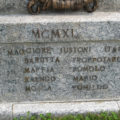I’ve spent the last two weeks interpreting (English to Italian and back again) for depositions in an arbitration between a Venezuelan and an Italian company – work that I was offered via a colleague on the board of Democrats Abroad-Milan. It was arranged at the last minute, so the hirers didn’t insist on any special qualifications beyond fluency in both languages, and an American accent (for the benefit of the court reporters coming from Miami to transcribe). The money was very, very good (and very handy right now), so I made time for the job.
It was an interesting, though exhausting, experience. It wasn’t quite simultaneous translation, but near enough, especially when the lawyer started machine-gunning questions. And I had to think hard about precise shades of meaning. In a legal situation, it’s more important to get the exact meaning of both questions and answers than to translate elegantly – which frustrated me at first, since I’m a writer, and style is important to me.
The English language skills of the witnesses varied, improving steadily as we moved up the ranks of the company (cause or effect?). Everyone we interviewed was an engineer in some sense or other, and therefore understood and used many English terms in his everyday work. (“His” is the correct pronoun – they were all men.) And there are many English words in common use in business Italian where there is no efficient equivalent in Italian, e.g. “training.”
Most of the witnesses understood English well enough to follow most of the questions, although, when a single question ran on for a hundred words, I often lost track of it myself. With some witnesses, I was a mere convenience – they spoke and understood English well enough to do it all in English, so their lawyers’ insistence that I translate both questions and answers was simply a play for time, a way of forcing the witnesses to slow down and think before they spoke. One man kept answering the questions before I had a chance to translate. His lawyers frowned at me every time this happened but, hey, he’s your witness – you tell him how to behave. He was senior enough that I wasn’t going to interrupt his train of thought to translate a question that he had clearly understood perfectly. I also didn’t want to insult anyone’s English abilities.
The last witness, a senior VP, conducted his deposition entirely in very good English, and was in no danger of shooting off his mouth.
There were two tracks of depositions going on at the same time, and in the second week professional interpreters were brought in for the other track. I learned from them that I was being a masochist – the pros work half-day shifts, and were astonished that I was doing full days, especially with no prior experience. They agreed with my finding that about 40 minutes at a time is the most one can expect to be effective – around the 45-minute mark I would begin to feel my synapses smoking. Thankfully, there were breaks every hour, to change the videotape and allow the teams of lawyers to confer among themselves.
I came away with a few observations which had nothing to do with translation. One was a reinforced belief that I would never be able to work for a typical Italian company of this type. There were six or seven levels of hierarchy among the various men we interviewed, with the guys at the top living on Mount Olympus as far as their juniors were concerned. In turn, the top guy had about 1300 people working for him, most of whose names he barely knew. <shudder> I couldn’t bear to be in an organization like that. Even at Roxio, I had direct access to the CEO (and a cubicle conveniently located outside his office). Not that that access did me much good…
I also admired the skills of the lawyers. In addition to the law (of at least three countries), they had to know the reams of documentation that had already been presented in the case, as well as the reams being generated in the current testimony, and make use of it to try to trap the witnesses into admissions which the witnesses’ lawyers were equally cleverly helping their clients to sidestep. They all brought an oratorical and actorly flair to the process, one side building up the emotional pressure and trying to cause a slip, while the other side made convenient objections and used the hourly breaks to instruct the witnesses (I presume – I was never privy to what went on between the witnesses and their counsel).
I developed techno-lust for the Blackberries that all the lawyers were so attached to. I had vaguely heard about these and knew them to be particularly popular in Washington, and had just noticed them advertised by Italian mobile phone providers. One of the lawyers told me they’re cheap in the US – as low as $120 for the device, plus $25 a month or so for the service. Not cheap in Italy, as I shortly discovered. One of the companies is charging 576 euros for the device, and after that I didn’t bother to ask how much they were charging for the service. I’ll either have to wait, or figure out whether it’s possible to use a US-purchased Blackberry with an Italian SIM card.






